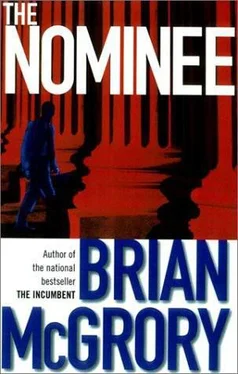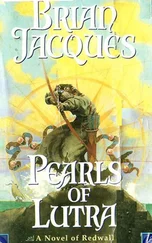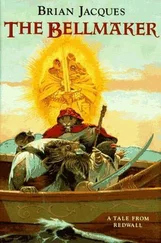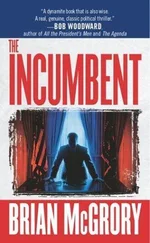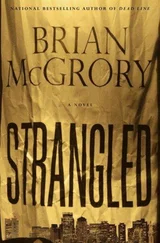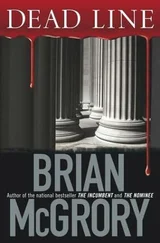Some people would say that we destroyed the newspaper that very night. Maybe I’m just a contrarian, but I’d argue that what we did was save it. We purged it of its darkest secrets, we made a stunningly public penance, and now we move on. Only time will tell the ultimate outcome, but so far, time has been very kind indeed.
The next morning, I took a fresh copy of the Sunday paper over to Hank Sweeney’s hospital room. Last time I saw Sweeney, he was lying on his back on the dusty floor of an evidence archive with a formless circle of blood growing on the front of his black sweatshirt. Now, he was stretched out, sound asleep, with a collection of tubes and wires extending from each arm. He looked old, but he looked peaceful.
I was reading theRecord ’s sports section when he woke up. He blinked a couple of times, and I stood over him and said, “You’re not having a nightmare, it’s really me.” I handed him the front page and pointed at the story that rectified the lies told about his only son. I watched him read, and then I watched the tears roll down his cheeks like a driving April rain.
“I have to tell this to Mary Mae,” he said, reaching for the phone, his voice still weak.
I put my hand on his wrist and told him, “I know you do, Hank. I know you do. But I also know that Mary Mae is dead.” And with that, he cried anew, tears of sadness and joy falling at the same time.
“And Hank,” I added, “I don’t want you going back to Florida. You’re coming to live with me.”
I was waiting for him to argue the latter point, but he didn’t. So for the last week, Baker and I have had a new roommate to go along with the new apartment I rented on Commonwealth Avenue. I can hear him snoring two rooms away — Hank, not the dog.
After I wrote the story, after the presses were safely rolling, I paged my old cop friend, Tommy O’Brien, and told him to head over to School Street and arrest himself a murderer. The police didn’t actually file charges against Randolph until the next day, when the paper was out and they had no choice, and even then, it was only for assault with a deadly weapon. The murder-for-hire charge for Paul’s death came later that week, when it was shown that Kevin Clancy, a convicted felon, was paroled a few weeks before at Randolph’s quiet urging, right about the time I started working on the inflated conviction rates story. After that, President Clayton Hutchins announced that he had “reluctantly” accepted Randolph’s decision to drop out of the running. John Cutter’s death is still being reinvestigated.
I miss Fitzgerald. I miss him like crazy, at least the Fitzgerald I thought I knew. Last time I saw him was when he walked out of his office, his face ashen, his arm dripping blood, his career in utter shambles. Since then, he’s gone to that special, hellish place reserved for so many disgraced journalists and failed politicians. It’s called talk radio. He hasn’t begun his show yet, but the station is already advertising the hell out of him.
The police commissioner resigned the very day the story came out. Try as I might, I couldn’t pin criminal wrongdoing on Luke Travers, though we essentially indicted him in the newspaper on multiple counts of being an excessive jackass and a complete incompetent. I think he’s manning phones over at headquarters these days — and even then, I think he’s over his pasty head.
The paper? Well, Terry Campbell abandoned his takeover bid. He was quoted in theWall Street Journal calling theRecord a “loony bin.” The board of directors asked if I’d take over as publisher, and lead the newspaper through this tumultuous time. I said no. Justine Steele would do it better, I told them, and so far, she has.
She asked me to be editor. I, in turn, rewarded Vinny Mongillo with the job of senior political reporter, the one that Fitzgerald had held. “How,” he asked me, “do I come in and fill the shoes of the guy who has written the most widely read prose in the city for more than a quarter of a century?”
“I haven’t the faintest idea,” I told him.
So why, you might ask, if I’m the editor of theRecord, am I here at a roadside bar just west of nowhere on another gang bang of a story that no one in their right mind will remember a week from whenever? Because the Jack Flynn era at theRecord lasted all of three days — the amount of time it took me to realize that the editor-in-chief spends the bulk of his or her time shuttling between meetings, deciphering budgets, and plotting personnel changes. Give me a Bic Click, a yellow legal pad, and a word processor anytime. The national search for a replacement is being conducted right now.
That just about covers everyone, except Brent Cutter, who I haven’t seen since I shoved him up against the wall. I don’t believe anyone’s even noticed that he’s gone.
I paid my tab, which came to $9.50 for four Budweisers and the bag of Chee-tos, and made a mental note to come here more often. I bade a warm farewell to my less than chatty bar mate, who continued to show me the back of his sweaty head. I started out the door destined for the Swirlington Ritz-Carlton, also known as the Motel 6. I assume they left a light on for me.
That’s when I saw her. She was at a table right behind the bar, sitting there eating a plate of chicken wings with a Miller Lite and that day’s paper spread out in her perfect lap.
“Hello, Jack,” she said, licking the sauce off one of her own fingers, cocking her head slightly in that way she does, her long brown hair falling like silk to one side. She said it in a way that said she had seen me all along.
She looked as she always looks, which is gorgeous, tall, elegant, and so cruelly, inexorably familiar.
“Hello, Elizabeth,” I replied. “I thought you’d left the business.”
“Tried to, but couldn’t. I’m stringing for theWashington Post.”
I stood there looking at her, and she sat there looking back at me. I wasn’t sure what was left to say, but she seemed to have an idea. She said, and I quote, “I love you.”
Well, that hit me harder than Kevin Clancy or Lance Randolph ever did. I felt my chest go light. I felt my throat close in. Somewhere in the near distance, I heard that lowlife of a producer tell someone in Atlanta that he had to fly tomorrow to Detroit. I heard the cut-in anchorwoman on the bar television say something about more indictments expected in the Lance Randolph case.
I loved her too. Always had, always will. I stared hard at her, sitting there looking so calm and confident. I asked, “Then what went wrong?”
She shook her head, her eyes never for a moment leaving mine. “Life went wrong, and we didn’t try hard enough to right it,” she said. “Maybe it’s about time we did that now.”
I looked down at the dirty linoleum floor of this bucket of blood bar. I didn’t hear her get up. I didn’t notice her walk toward me. When I lifted my head, ready to tell her something that I never quite got out and have long since forgot, her face was just inches from mine. And she kissed me — the most comfortable, most sensual, most familiar kiss I’ve ever had.
She pulled back a little, or maybe that was me. When she blinked, I felt her eyelashes on my cheek. She wasn’t moving, and neither was I. She said softly, her breath on my face, “I’m never giving you up, Jack, so don’t even think about trying to get away.”
I asked, “Never means never, right?”
She looked at me, her face contorted into a smile born of endless relief, not sexy in this one moment, but stunningly beautiful, a smile that could define a life. And she kissed me again, hard, her arms wrapped around my neck. “Never means never,” she said.
And with that, it was time to move on.
Читать дальше
